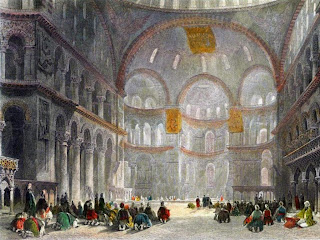
While modern Turkey is a relatively young republic having been founded upon the remains of the Ottoman Empire in 1923, it is an ancient land, the cradle of civilization and the center of world history. The site of the first human settlement; the seat of the Greek, Roman and Ottoman Empires; is just a microscopic sampling of Turkey's extraordinary heritage. The Mongolian Empire was torn by internal struggles and soon fell apart. As a result, the Turks' influence in Anatolia continued to grow. During the 1300s, a group of Turks called the Ottomans began to build a mighty empire. In 1326, they seized the Anatolian city of Bursa, which became their capital. By the late 1300s, the Ottomans had conquered the western two-thirds of Anatolia; most of Thrace; and much of the Balkan Peninsula, including Greece. All that remained of the Byzantine Empire was the are aaround Constantinople. Mustafa Kemal, a Turkish military hero, quickly organized a nationalist movement. Under the leadership of Kemal, a nationalist congress met Sivas in Semptember to form a new temporary government. In April 1920, the congress organized the Turkish Grand National Assembly in Ankara and elected Kemal as Assembly president.
What are 3 Significant Facts?:
-1500 B.C.-The Hittites, the earliest known inhabitants of what is now Turkey, ruled in Anatolia.
-1947-Turkey received economic and military aid from the United States to resist Soviet expansion.
-1960-Turkish army units overthrew the government and ruled until free elections were held in 1961.
War of Independence (1919-1923):
Turkish nationalists established modern Turkey as an outcome of the Turkish War of Independence, mostly on what was to become Turkish territory, as of the Treaty of Lausanne. The war resulted in the defeat of Greece in western Turkey, the East Armenian states on the east; (2 November 1920 Treaty of Gümrü), Britain, France, and Georgia.
The Treaty of Lausanne, signed on July 24, 1923, and negotiated by İsmet İnönü on behalf of the Ankara government, established most of the modern boundaries of the country (except the province of Hatay, formerly the Syrian province of Alexandretta, which joined Turkey following a referendum organized in 1939 after having gained its independence from France in 1938). The Treaty of Lausanne also led to the international recognition of the sovereignty of the new Republic of Turkey as the successor state of the defunct Ottoman Empire. The Republic of Turkey was founded as a nation-state on the French Revolutionary model.
Fun Fact- Turkey is one of the most advanced Muslim countries in the world. Turkey is the only secular Muslim country amongst all the Muslim countries in the world.
No comments:
New comments are not allowed.